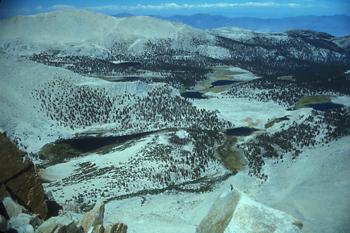Hiking safely is about being prepared for any situation.
Here's one scenario where the hikers make mistake after mistake, with disastrous results:

A group of four friends set a date to hike Cirque Peak, making the date months in advance. The night before they drive four hours from home to a lodging near the trailhead. The next morning the weather forecast states that in the valleys, the day will be pleasantly warm, but that afternoon thunderstorms can be expected in higher elevations. It's warm and sunny when they leave their overnight accommodations, so they set out in cotton shorts, T-shirts and sneakers.
* MISTAKE #1: Weather can change very quickly in the mountains, and the higher you go, the colder, windier and wetter the weather is likely to be. Afternoon thunderstorms in the Sierra Nevada can mean cold winds, rain, hail, snow (even in August) and lightning. The friends should have either elected to TURN BACK and postponed their hike, or been PREPARED WITH KNOWLEDGE AND GEAR for stormy weather.
The friends each carry a candy bar and a bottle of water; one person has a cell phone, another has compass, but has never used it before. They had no map.
* MISTAKE #2: They are not PREPARED FOR EMERGENCIES. They don't have a pocket knife, maps, flashlight, First-Aid kit, rain or wind gear, or anything to start a fire. Cell phones often don't work in the mountains as the land mass can block signals. A map and compass can only get you home if you know how to use it. Dont assume you will be rescued; know how to rescue yourself.
On the way to the trailhead, one member of the group suggests they take a different, more difficult trail because he's heard that it's a quicker route to the summit.
* MISTAKE #3: They changed plans. If they had told anyone the trail they planned to hike and when they expected to be back, the information would send rescuers off in the wrong direction. They should LEAVE THEIR PLANS with friends or family before setting out and stick to those plans as best you can. You should also sign a hiking register, if available.
One friend, a self-proclaimed "couch potato" has never hiked before; the others assure their friend that "it'll be a piece of cake. If you lag behind, we'll wait up ahead for you to catch up."
* MISTAKE #4: They didn't pace their hike to the slowest member of the group. They should STAY TOGETHER, starting as a group, hiking as a group, ending as a group.
They set out up the mountain. Clouds begin to form and a cold wind begins to blow. The "couch potato" falls further and further behind. When the three stronger hikers come in sight of the summit, it starts to rain .. which turns to hail .. electricity is in the air. Two of the group decide to make for the summit since it's so close .. ignoring the lightning hazard.
* MISTAKE #5: Not only have they again failed to stay together, the trio didn't TURN BACK when conditions changed.
The third member of the group heads back to find their slower friend. Not finding the friend on the trail, this hiker returns to the trailhead and summons help.
It's only been a few hours since this group of friends started out. The weather continues to get worse and it takes many more hours for search and rescue teams to find both the single hiker and the duo and bring them out safely. The cost for these rescues is in the thousands, and searchers have been put at risk.